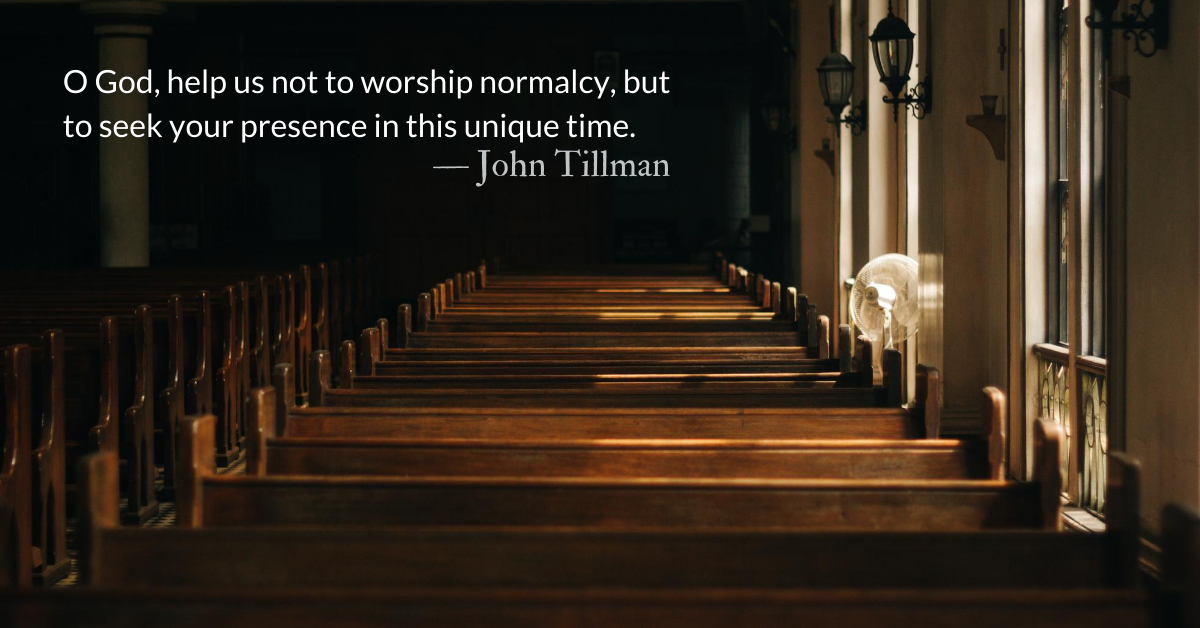Scripture Focus: Jeremiah 27.16-17
16 Then I said to the priests and all these people, “This is what the Lord says: Do not listen to the prophets who say, ‘Very soon now the articles from the Lord’s house will be brought back from Babylon.’ They are prophesying lies to you. 17 Do not listen to them. Serve the king of Babylon, and you will live. Why should this city become a ruin?
Matthew 13.1-2
As Jesus was leaving the temple, one of his disciples said to him, “Look, Teacher! What massive stones! What magnificent buildings!”
2 “Do you see all these great buildings?” replied Jesus. “Not one stone here will be left on another; every one will be thrown down.”
Reflection: Comfortable Prophecies
By John Tillman
People are harder to love than objects.
Objects make more predictable and controllable gods than the true and living One. Perhaps that is why we easily become attached to physical objects, places, and things and sometimes forget the God those things are intended to point us toward.
The people of Jerusalem were very attached to the physical implements of their worship in the Temple. It was a shock to them when Nebuchadnezzar took away many articles from the Temple along with the previous king, Jehoiachin. Their patterns of worship were disrupted.
This shock, however, did not cause the people to return to proper worship of God. Instead, it pushed them further into denial and brought forth false prophets who would tell the people exactly what they wanted to hear.
“The articles of the Temple will return!”
“The suffering will be over soon.”
“Normalcy will resume.”
These lies made very comfortable prophecies. Near irresistible. It is difficult to point a judgmental finger at the residents of Jerusalem for falling for these false prophets. The current suffering we are enduring is nothing anywhere near the scale that they were enduring. Even though our suffering is less severe than theirs, don’t we also feel the pull to grasp onto any far-fetched hope of an end and a return to normalcy?
Jeremiah’s prophecies are uncomfortable. People considered them unpatriotic. Jeremiah had a reputation for gloom as if his writings and prophecies contained no messages of hope or offers of forgiveness for the people. Yet, Jeremiah frequently and beautifully describes God’s longing to bless the people and save them from further destruction. But they are unwilling to do what God asks. They are unwilling to submit. They are unwilling to be humbled or to acknowledge the sins that led them to this point. They are unwilling to live under the consequences of their sins.
O God, help us not to worship normalcy, but to seek your presence in this unique time.
May we find our comfort in you rather than in things we demand that you restore to us.
May we not long for the missing “instruments” of worship more than we long for you, the object of our worship.
O God, help us not be misled by false prophets offering comfort instead of truth.
Give us discernment and faith.
Divine Hours Prayer: The Morning Psalm
Our iniquities you have set before you, and our secret sins in the light of your countenance.
When you are angry, all our days are gone; we bring our years to an end like a sigh.
The span of our life is seventy years, perhaps in strength even eighty; yet the sum of them is but labor and sorrow, for they pass away quickly and we are gone.
Who regards the power of your wrath? Who rightly fears your indignation:
So teach us to number our days that we may apply our hearts to wisdom. — Psalm 90.8-12
– Divine Hours prayers from The Divine Hours: Prayers for Summertime by Phyllis Tickle
Today’s Readings
Jeremiah 27 (Listen – 3:52)
Mark 13 (Listen – 4:32)
Today’s Readings
Jeremiah 28 (Listen – 3:05) Mark 14 (Listen – 8:37)
Jeremiah 29 (Listen – 5:44) Mark 15 (Listen – 5:16)
#ReadersChoice is time for you to share favorite Park Forum posts from the year.
What post helped you understand the gospel?https://forms.gle/DsYWbj45y9fCDLzi7

Read more about Treasuring Our Temples
Judah treasured the Temple’s importance but not its inhabitant. They treasured the regalia, not the relationship.







